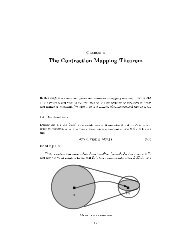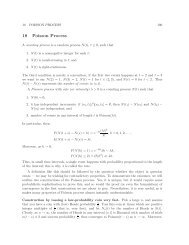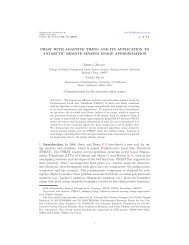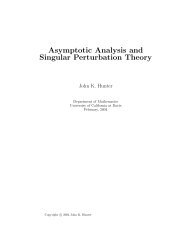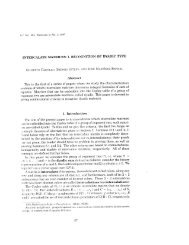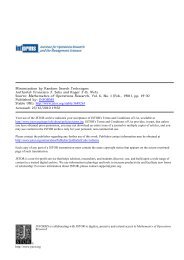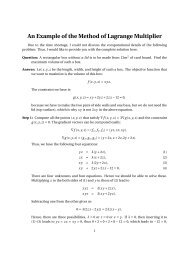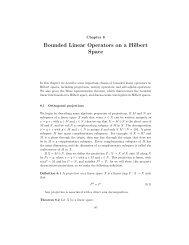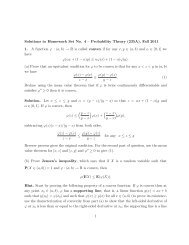The Riemann Integral
The Riemann Integral
The Riemann Integral
You also want an ePaper? Increase the reach of your titles
YUMPU automatically turns print PDFs into web optimized ePapers that Google loves.
22 1. <strong>The</strong> <strong>Riemann</strong> <strong>Integral</strong><br />
We can extend the additivity property of the integral by defining an oriented<br />
<strong>Riemann</strong> integral.<br />
Definition 1.34. If f : [a,b] → R is integrable, where a < b, and a ≤ c ≤ b, then<br />
∫ a<br />
f = −<br />
∫ b<br />
b a<br />
f,<br />
∫ c<br />
c<br />
f = 0.<br />
With this definition, the additivity property in <strong>The</strong>orem 1.33 holds for all<br />
a,b,c ∈ R for which the oriented integrals exist. Moreover, if |f| ≤ M, then the<br />
estimate in Corollary 1.32 becomes<br />
∫ b<br />
f<br />
∣ ∣ ≤ M|b−a|<br />
for all a,b ∈ R (even if a ≥ b).<br />
a<br />
<strong>The</strong> oriented <strong>Riemann</strong> integral is a special case of the integral of a differential<br />
form. It assigns a value to the integral of a one-form f dx on an oriented interval.<br />
1.7. Further existence results for the <strong>Riemann</strong> integral<br />
In this section, we prove several further useful conditions for the existences of the<br />
<strong>Riemann</strong> integral.<br />
First, we show that changing the values of a function at finitely many points<br />
doesn’t change its integrability of the value of its integral.<br />
Proposition 1.35. Suppose that f,g : [a,b] → R and f(x) = g(x) except at<br />
finitely many points x ∈ [a,b]. <strong>The</strong>n f is integrable if and only if g is integrable,<br />
and in that case<br />
∫ b<br />
a<br />
f =<br />
Proof. It is sufficient to prove the result for functions whose values differ at a<br />
single point, say c ∈ [a,b]. <strong>The</strong> general result then follows by induction.<br />
Since f, g differ at a single point, f is bounded if and only if g is bounded. If<br />
f, g are unbounded, then neither one is integrable. If f, g are bounded, we will<br />
show that f, g have the same upper and lower integrals because their upper and<br />
lower sums differ by an arbitrarily small amount with respect to a partition that is<br />
sufficiently refined near the point where the functions differ.<br />
Suppose that f, g are bounded with |f|,|g| ≤ M on [a,b] for some M > 0. Let<br />
ǫ > 0. Choose a partition P of [a,b] such that<br />
∫ b<br />
a<br />
g.<br />
U(f;P) < U(f)+ ǫ 2 .<br />
Let Q = {I 1 ,...,I n } be a refinement of P such that |I k | < δ for k = 1,...,n, where<br />
δ = ǫ<br />
8M .




